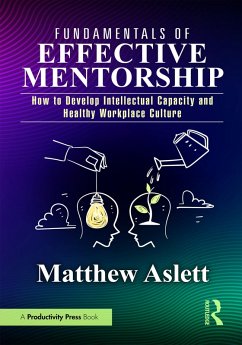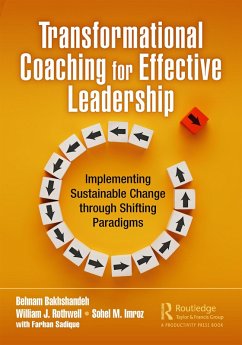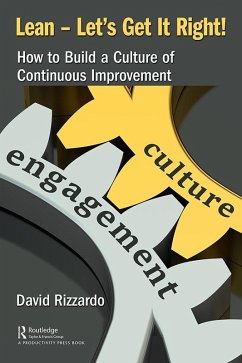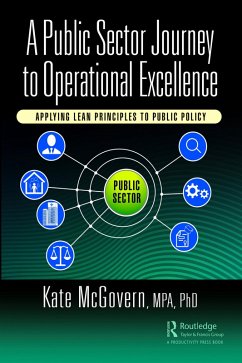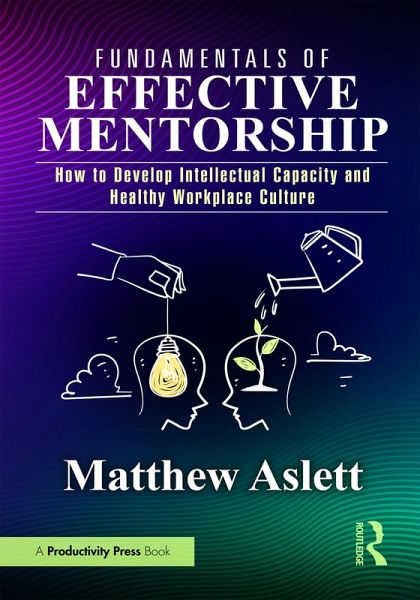
Fundamentals of Effective Mentorship (eBook, PDF)
How to Develop Intellectual Capacity and Healthy Workplace Culture
Versandkostenfrei!
Sofort per Download lieferbar
33,95 €
inkl. MwSt.
Weitere Ausgaben:

PAYBACK Punkte
17 °P sammeln!
In an ever-changing environment, organizations are required to identify and implement numerous decisions about strategic and operational activities. Organizations must consider aspects such as research and development, financial planning, data analytics, information technology, marketing, and production. However, organizational leaders must not neglect the importance of a critical element, which is human resources.The ability to cultivate intellectual capacity and healthy workplace culture can guide an organization to leverage unique abilities, achieve meaningful objectives, and maximize the p...
In an ever-changing environment, organizations are required to identify and implement numerous decisions about strategic and operational activities. Organizations must consider aspects such as research and development, financial planning, data analytics, information technology, marketing, and production. However, organizational leaders must not neglect the importance of a critical element, which is human resources.
The ability to cultivate intellectual capacity and healthy workplace culture can guide an organization to leverage unique abilities, achieve meaningful objectives, and maximize the possibility of sustainable success. As a result, the ability to encourage two-way learning relationships through mentorship can help organizations to improve effectiveness. A mentorship program can empower mentors, mentees, and program leaders to share best practices. The mentorship process is integral for promoting the professional and personal growth of stakeholders within an organization. Through a program tailored specifically to organizational needs, the implications of effective mentorship could positively impact individuals, groups, institutions, and broader communities.
Mentorship can occur both formally and informally in diverse areas such as education, business, medicine, law, engineering, technology, arts, sciences, and multi-disciplinary domains. This book communicates considerations for the facilitation of mentorship programs and development of mentorship relationships based on experiences from a practitioner lens. Readers are reintroduced to mentorship and will learn about the value that can be created for an organization. The exploration of identities, possible outcomes, approaches, and accessibility can spark ideation about recommendations for the reader's organizational context. Readers will embark on a journey to generate new or challenge existing insights through reflective guiding questions.
The ability to cultivate intellectual capacity and healthy workplace culture can guide an organization to leverage unique abilities, achieve meaningful objectives, and maximize the possibility of sustainable success. As a result, the ability to encourage two-way learning relationships through mentorship can help organizations to improve effectiveness. A mentorship program can empower mentors, mentees, and program leaders to share best practices. The mentorship process is integral for promoting the professional and personal growth of stakeholders within an organization. Through a program tailored specifically to organizational needs, the implications of effective mentorship could positively impact individuals, groups, institutions, and broader communities.
Mentorship can occur both formally and informally in diverse areas such as education, business, medicine, law, engineering, technology, arts, sciences, and multi-disciplinary domains. This book communicates considerations for the facilitation of mentorship programs and development of mentorship relationships based on experiences from a practitioner lens. Readers are reintroduced to mentorship and will learn about the value that can be created for an organization. The exploration of identities, possible outcomes, approaches, and accessibility can spark ideation about recommendations for the reader's organizational context. Readers will embark on a journey to generate new or challenge existing insights through reflective guiding questions.
Dieser Download kann aus rechtlichen Gründen nur mit Rechnungsadresse in A, B, BG, CY, CZ, D, DK, EW, E, FIN, F, GR, HR, H, IRL, I, LT, L, LR, M, NL, PL, P, R, S, SLO, SK ausgeliefert werden.




